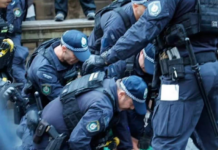“Shoot me!” The voices of Sri Lankan refugees – a heartbreaking video. Indonesian authorities refuse to allow the 44 Sri Lankans leave a boat which has been stranded off the coast of Aceh for almost one week. Video: Nakkheeranwebtv
By Saifulbahri Ismail in Jakarta
On June 11, a boat of 44 Sri Lankans was discovered in the waters of Aceh, a northern province of Indonesia. They were en route to Australia when the boat encountered engine problems.
It is a situation that Indonesian officials are all too familiar with. It is a reminder of the 2015 migrant crisis when thousands of Rohingya from Myanmar and Bangladesh left their homes in rickety smuggler’s boats and travelled to Southeast Asia.
“The Indonesian authorities are quite well prepared to deal with these boat arrivals,” said Paul Dillon, media officer at the International Organisation for Migration (IOM). “When matters unfolded last May there were roughly 1800 individuals who arrived from Bangladesh and Myanmar.
“The Indonesian government has a lot of experience, sadly, from many years of emerging as a transit country for migrants who are trying to establish themselves for a better life in other countries.”
The crisis prompted countries to reinvigorate coordinated efforts to better tackle the regional challenge of irregular migration.
“Indonesia’s position is still the same in tackling irregular migrants,” said the spokesperson of its foreign ministry, Arrmanatha Nasir. “It should be resolved not only by the country of transit, but also the countries of destination and origin – just like a year ago when we managed to work together with the country of origin, IOM and UNHCR until (the migrants) are able to go back to their place of origin.”
300 still in camps
Out of the more than 1000 Rohingya migrants who reached Indonesia’s shores last year, about 300 of them still reside in various camps in Aceh.
Many have left the camps on their own to go to Malaysia with the help of people smugglers.
Most of them still in the camps have already been verified by UNHCR as refugees.
Altogether there are nearly 14,000 asylum seekers and refugees in Indonesia. A number of them have been resettled to other countries, but many are still stuck in transit for many years.
Indonesia is not a signatory to the UN refugee convention and refugees cannot legally work here while waiting for resettlement in a third country.
‘Spirit of humanitarianism’
“Even though Indonesia is not a signatory – they’ve not signed the refugee convention – they live up to their humanitarian responsibilities and the spirit of humanitarianism that I think most Indonesians have,” said Thomas Vargas, a representative at the United Nations High Commissioner for Refugees.
“It’s very important that that spirit continues and by signing the refugee convention, I think the government could move even further in showing solidarity with the international community, with other countries around the world,” he added.
For the refugees who are in transit, it could be a long wait for them before they can be resettled or even reunited with other family members in another country.
Until that happens, government, agencies and local communities have a shared responsibility to make their stay a little more bearable in the name of humanity.










































